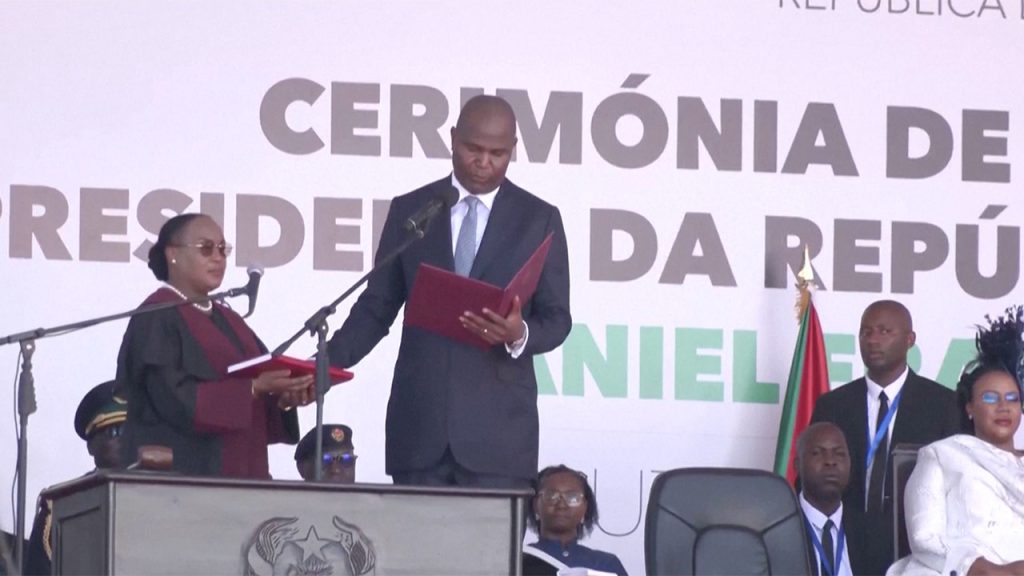Paragraph 1: A Disputed Election and Its Aftermath
The inauguration of Filipe Nyusi as president of Mozambique for a third term marked the culmination of a highly contested electoral process marred by accusations of fraud, violence, and widespread protests. Nyusi, representing the long-ruling Frelimo party, secured victory in the October 9, 2024, elections, a result immediately challenged by the opposition and questioned by international observers. The opposition Renamo party, led by Ossufo Momade, alleged widespread vote-rigging and irregularities, casting a shadow over the legitimacy of the election outcome. These allegations were echoed by Western observers, who raised concerns about the fairness and transparency of the voting process.
Paragraph 2: A Legacy of Power and Conflict
Frelimo, having governed Mozambique since independence from Portuguese colonial rule in 1975, maintained its grip on power amidst a turbulent history, including a protracted 15-year civil war. The party’s unbroken rule has faced criticism for its perceived authoritarian tendencies and suppression of dissent. The post-election period witnessed an escalation of tensions and clashes between security forces and opposition supporters, resulting in a tragic loss of life. Civil society groups reported a significant death toll, exceeding 300 individuals, adding a grave dimension to the political crisis.
Paragraph 3: A Sparse Inauguration Amidst Security Concerns
Nyusi’s inauguration ceremony, held in the capital city of Maputo, was notably subdued, with a limited attendance reflecting the deep divisions within the country. The heavy presence of police and army personnel underscored the heightened security concerns in the wake of the post-election unrest. While regional leaders like South African President Cyril Ramaphosa were present, the absence of many other heads of state signaled a degree of international unease regarding the election’s legitimacy. Nyusi, in his address, emphasized the importance of social and political stability as his government’s primary focus. He outlined a series of policy priorities, including reducing the size of government, addressing youth unemployment, and investing in health and education.
Paragraph 4: The Opposition’s Resilience and Mounting Protests
Opposition leader Ossufo Momade’s return from self-imposed exile added fuel to the growing protests. Momade called on his supporters to continue demonstrating against the disputed election results, galvanizing the opposition movement. The scale of these protests marked a significant turning point in Mozambique’s political landscape, representing the largest challenge to Frelimo’s authority in the country’s history. The sustained demonstrations reflected a growing discontent with Frelimo’s long-standing rule and raised concerns about the potential for further instability.
Paragraph 5: Economic and Social Repercussions
The political turmoil and widespread protests had far-reaching consequences for Mozambique’s economy and social fabric. Foreign businesses operating in the resource-rich nation faced disruptions, impacting investment and economic activity. Cross-border trade was also significantly affected, straining regional economic relations. The escalating violence and insecurity forced many citizens to flee their homes, seeking refuge in neighboring countries, exacerbating humanitarian concerns.
Paragraph 6: A Nation at a Crossroads
Mozambique stands at a critical juncture, grappling with the aftermath of a disputed election and facing the challenge of forging a path towards stability and reconciliation. The government’s ability to address the root causes of the unrest, including allegations of electoral fraud and concerns about political freedoms, will be crucial in restoring public trust. The international community’s role in mediating the political crisis and supporting efforts to promote dialogue and democratic reforms will be essential in helping Mozambique navigate this challenging period. The country’s future hinges on the ability of all stakeholders to engage in constructive dialogue and work towards a peaceful resolution that respects the democratic rights and aspirations of all Mozambicans.

